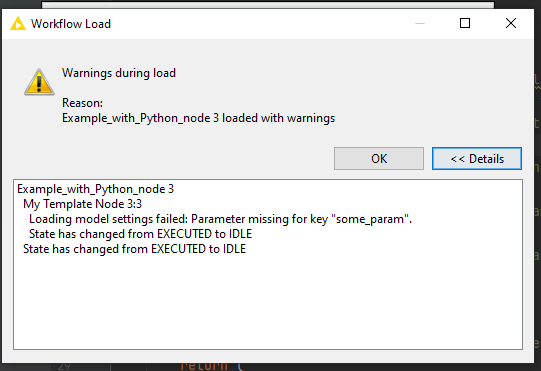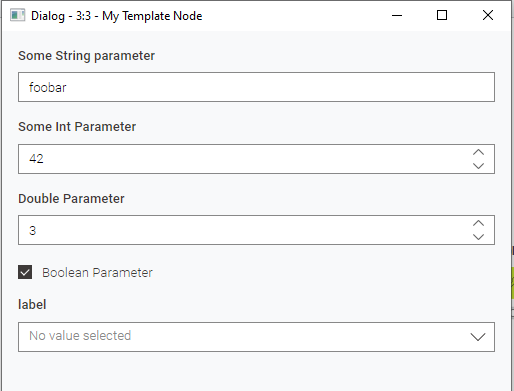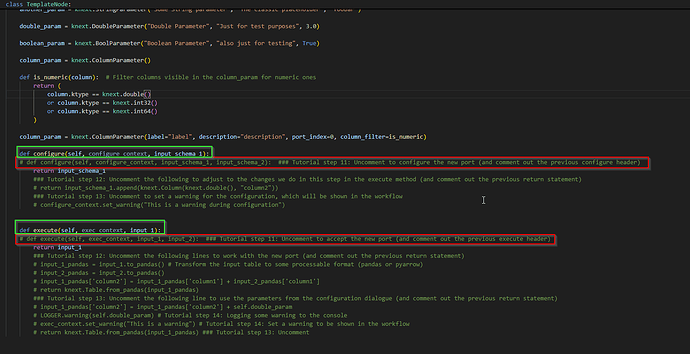Ah yes, if I save the workflow and reopen without changing anything it skips the warning. Does that mean the first time anyone new opened the workflow with my module it would give his warning?
And yes, just changed to comments around -
import logging
import knime.extension as knext
LOGGER = logging.getLogger(__name__)
@knext.node(name="My Template Node", node_type=knext.NodeType.LEARNER, icon_path="icon.png", category="/")
@knext.input_table(name="Input Data", description="We read data from here")
@knext.input_table(name="Tutorial: Input Data 2", description="We also read data from here") ### Tutorial step 11: Uncomment to create a new input port
@knext.output_table(name="Output Data", description="Whatever the node has produced")
class TemplateNode:
#
# This node has a description
#
# ### Tutorial step 10: Uncomment all of the following parameters and the 'is_numeric' method to create your first dialogue ###
# (Restart KAP and drag&drop the node again from the node repository to let changes take effect)
some_param = knext.IntParameter("Some Int Parameter", "The answer to everything", 42, min_value=0)
another_param = knext.StringParameter("Some String parameter", "The classic placeholder", "foobar")
double_param = knext.DoubleParameter("Double Parameter", "Just for test purposes", 3.0)
boolean_param = knext.BoolParameter("Boolean Parameter", "also just for testing", True)
column_param = knext.ColumnParameter()
def is_numeric(column): # Filter columns visible in the column_param for numeric ones
return (
column.ktype == knext.double()
or column.ktype == knext.int32()
or column.ktype == knext.int64()
)
column_param = knext.ColumnParameter(label="label", description="description", port_index=0, column_filter=is_numeric)
#def configure(self, configure_context, input_schema_1):
def configure(self, configure_context, input_schema_1, input_schema_2): ### Tutorial step 11: Uncomment to configure the new port (and comment out the previous configure header)
# return input_schema_1
### Tutorial step 12: Uncomment the following to adjust to the changes we do in this step in the execute method (and comment out the previous return statement)
return input_schema_1.append(knext.Column(knext.double(), "column2"))
### Tutorial step 13: Uncomment to set a warning for the configuration, which will be shown in the workflow
# configure_context.set_warning("This is a warning during configuration")
# def execute(self, exec_context, input_1):
def execute(self, exec_context, input_1, input_2): ### Tutorial step 11: Uncomment to accept the new port (and comment out the previous execute header)
# return input_1
### Tutorial step 12: Uncomment the following lines to work with the new port (and comment out the previous return statement)
input_1_pandas = input_1.to_pandas() # Transform the input table to some processable format (pandas or pyarrow)
input_2_pandas = input_2.to_pandas()
input_1_pandas['column2'] = input_1_pandas['column1'] + input_2_pandas['column1']
return knext.Table.from_pandas(input_1_pandas)
### Tutorial step 13: Uncomment the following line to use the parameters from the configuration dialogue (and comment out the previous return statement)
# input_1_pandas['column2'] = input_1_pandas['column2'] + self.double_param
# LOGGER.warning(self.double_param) # Tutorial step 14: Logging some warning to the console
# exec_context.set_warning("This is a warning") # Tutorial step 14: Set a warning to be shown in the workflow
# return knext.Table.from_pandas(input_1_pandas) ### Tutorial step 13: Uncomment
And here is the whole error from the log -
2024-09-21 09:35:30,535 : WARN : KNIME-Worker-0-My Template Node 3:3 : : CloseablePythonNodeProxy : My Template Node : 3:3 : Traceback (most recent call last):
File "C:\Users\chris\AppData\Local\Programs\KNIME\plugins\org.knime.python3.nodes_5.3.2.v202409031144\src\main\python\_node_backend_launcher.py", line 999, in execute
outputs = self._node.execute(exec_context, *inputs)
^^^^^^^^^^^^^^^^^^^^^^^^^^^^^^^^^^^^^^^^^
File "C:\Users\chris\AppData\Local\Programs\KNIME\plugins\org.knime.python3.nodes_5.3.2.v202409031144\src\main\python\knime\extension\nodes.py", line 1202, in wrapper
results = func(*args, **kwargs)
^^^^^^^^^^^^^^^^^^^^^
File "C:\Users\chris\grid3\knime\tutorial_extension\my_extension.py", line 50, in execute
input_1_pandas = input_1.to_pandas() # Transform the input table to some processable format (pandas or pyarrow)
^^^^^^^^^^^^^^^^^^^
File "C:\Users\chris\AppData\Local\Programs\KNIME\plugins\org.knime.python3.arrow_5.3.2.v202409040940\src\main\python\knime\_arrow\_table.py", line 249, in to_pandas
import knime._arrow._pandas as kap
File "C:\Users\chris\AppData\Local\Programs\KNIME\plugins\org.knime.python3.arrow_5.3.2.v202409040940\src\main\python\knime\_arrow\_pandas.py", line 50, in <module>
import pandas as pd
File "C:\Users\chris\anaconda3\envs\knime_env\Lib\site-packages\pandas\__init__.py", line 22, in <module>
from pandas.compat import is_numpy_dev as _is_numpy_dev # pyright: ignore # noqa:F401
^^^^^^^^^^^^^^^^^^^^^^^^^^^^^^^^^^^^^^^^^^^^^^^^^^^^^^^
File "C:\Users\chris\anaconda3\envs\knime_env\Lib\site-packages\pandas\compat\__init__.py", line 25, in <module>
from pandas.compat.numpy import (
File "C:\Users\chris\anaconda3\envs\knime_env\Lib\site-packages\pandas\compat\numpy\__init__.py", line 4, in <module>
from pandas.util.version import Version
File "C:\Users\chris\anaconda3\envs\knime_env\Lib\site-packages\pandas\util\__init__.py", line 8, in <module>
from pandas.core.util.hashing import ( # noqa:F401
File "C:\Users\chris\anaconda3\envs\knime_env\Lib\site-packages\pandas\core\util\hashing.py", line 24, in <module>
from pandas.core.dtypes.common import (
File "C:\Users\chris\anaconda3\envs\knime_env\Lib\site-packages\pandas\core\dtypes\common.py", line 26, in <module>
from pandas.core.dtypes.base import _registry as registry
File "C:\Users\chris\anaconda3\envs\knime_env\Lib\site-packages\pandas\core\dtypes\base.py", line 24, in <module>
from pandas.errors import AbstractMethodError
File "C:\Users\chris\anaconda3\envs\knime_env\Lib\site-packages\pandas\errors\__init__.py", line 6, in <module>
import ctypes
File "C:\Users\chris\anaconda3\envs\knime_env\Lib\ctypes\__init__.py", line 8, in <module>
from _ctypes import Union, Structure, Array
ImportError: DLL load failed while importing _ctypes: The specified module could not be found.
2024-09-21 09:35:30,713 : ERROR : KNIME-Worker-0-My Template Node 3:3 : : Node : My Template Node : 3:3 : Execute failed: DLL load failed while importing _ctypes: The specified module could not be found.
org.knime.python3.nodes.PythonNodeRuntimeException: DLL load failed while importing _ctypes: The specified module could not be found.
at org.knime.python3.nodes.CloseablePythonNodeProxy$FailureState.throwIfFailure(CloseablePythonNodeProxy.java:798)
at org.knime.python3.nodes.CloseablePythonNodeProxy.execute(CloseablePythonNodeProxy.java:562)
at org.knime.python3.nodes.DelegatingNodeModel.lambda$4(DelegatingNodeModel.java:180)
at org.knime.python3.nodes.DelegatingNodeModel.runWithProxy(DelegatingNodeModel.java:237)
at org.knime.python3.nodes.DelegatingNodeModel.execute(DelegatingNodeModel.java:178)
at org.knime.core.node.NodeModel.executeModel(NodeModel.java:588)
at org.knime.core.node.Node.invokeFullyNodeModelExecute(Node.java:1286)
at org.knime.core.node.Node.execute(Node.java:1049)
at org.knime.core.node.workflow.NativeNodeContainer.performExecuteNode(NativeNodeContainer.java:594)
at org.knime.core.node.exec.LocalNodeExecutionJob.mainExecute(LocalNodeExecutionJob.java:98)
at org.knime.core.node.workflow.NodeExecutionJob.internalRun(NodeExecutionJob.java:198)
at org.knime.core.node.workflow.NodeExecutionJob.run(NodeExecutionJob.java:117)
at org.knime.core.util.ThreadUtils$RunnableWithContextImpl.runWithContext(ThreadUtils.java:367)
at org.knime.core.util.ThreadUtils$RunnableWithContext.run(ThreadUtils.java:221)
at java.base/java.util.concurrent.Executors$RunnableAdapter.call(Unknown Source)
at java.base/java.util.concurrent.FutureTask.run(Unknown Source)
at org.knime.core.util.ThreadPool$MyFuture.run(ThreadPool.java:123)
at org.knime.core.util.ThreadPool$Worker.run(ThreadPool.java:246)
C:\Users\chris\anaconda3\envs\knime_env was created from the tutorial’s command -
conda create -n knime_env python=3.11 knime-python-base=5.3 knime-extension=5.3 -c knime -c conda-forge


